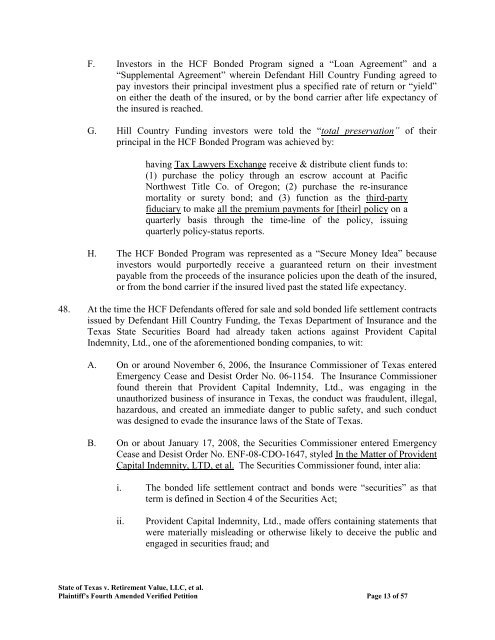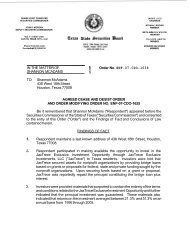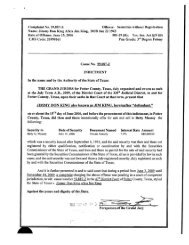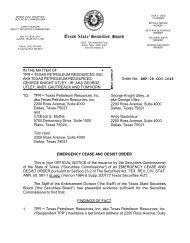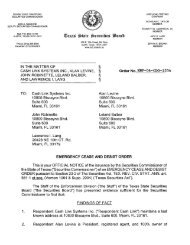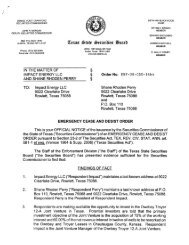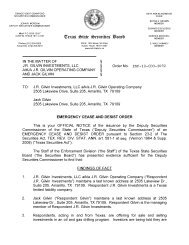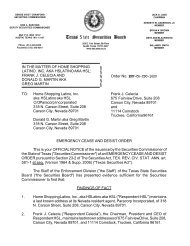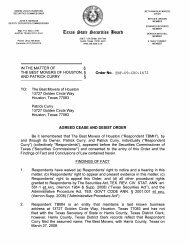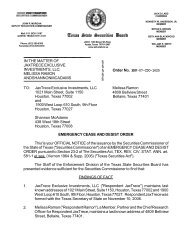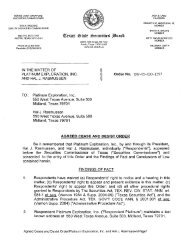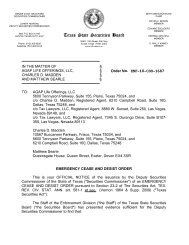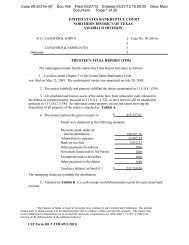Plaintiffs Fourth Amended Petition - Texas State Securities Board
Plaintiffs Fourth Amended Petition - Texas State Securities Board
Plaintiffs Fourth Amended Petition - Texas State Securities Board
You also want an ePaper? Increase the reach of your titles
YUMPU automatically turns print PDFs into web optimized ePapers that Google loves.
F. Investors in the HCF Bonded Program signed a “Loan Agreement” and a<br />
“Supplemental Agreement” wherein Defendant Hill Country Funding agreed to<br />
pay investors their principal investment plus a specified rate of return or “yield”<br />
on either the death of the insured, or by the bond carrier after life expectancy of<br />
the insured is reached.<br />
G. Hill Country Funding investors were told the “total preservation” of their<br />
principal in the HCF Bonded Program was achieved by:<br />
having Tax Lawyers Exchange receive & distribute client funds to:<br />
(1) purchase the policy through an escrow account at Pacific<br />
Northwest Title Co. of Oregon; (2) purchase the re-insurance<br />
mortality or surety bond; and (3) function as the third-party<br />
fiduciary to make all the premium payments for [their] policy on a<br />
quarterly basis through the time-line of the policy, issuing<br />
quarterly policy-status reports.<br />
H. The HCF Bonded Program was represented as a “Secure Money Idea” because<br />
investors would purportedly receive a guaranteed return on their investment<br />
payable from the proceeds of the insurance policies upon the death of the insured,<br />
or from the bond carrier if the insured lived past the stated life expectancy.<br />
48. At the time the HCF Defendants offered for sale and sold bonded life settlement contracts<br />
issued by Defendant Hill Country Funding, the <strong>Texas</strong> Department of Insurance and the<br />
<strong>Texas</strong> <strong>State</strong> <strong>Securities</strong> <strong>Board</strong> had already taken actions against Provident Capital<br />
Indemnity, Ltd., one of the aforementioned bonding companies, to wit:<br />
A. On or around November 6, 2006, the Insurance Commissioner of <strong>Texas</strong> entered<br />
Emergency Cease and Desist Order No. 06-1154. The Insurance Commissioner<br />
found therein that Provident Capital Indemnity, Ltd., was engaging in the<br />
unauthorized business of insurance in <strong>Texas</strong>, the conduct was fraudulent, illegal,<br />
hazardous, and created an immediate danger to public safety, and such conduct<br />
was designed to evade the insurance laws of the <strong>State</strong> of <strong>Texas</strong>.<br />
B. On or about January 17, 2008, the <strong>Securities</strong> Commissioner entered Emergency<br />
Cease and Desist Order No. ENF-08-CDO-1647, styled In the Matter of Provident<br />
Capital Indemnity, LTD, et al. The <strong>Securities</strong> Commissioner found, inter alia:<br />
i. The bonded life settlement contract and bonds were “securities” as that<br />
term is defined in Section 4 of the <strong>Securities</strong> Act;<br />
ii.<br />
Provident Capital Indemnity, Ltd., made offers containing statements that<br />
were materially misleading or otherwise likely to deceive the public and<br />
engaged in securities fraud; and<br />
<strong>State</strong> of <strong>Texas</strong> v. Retirement Value, LLC, et al.<br />
Plaintiff’s <strong>Fourth</strong> <strong>Amended</strong> Verified <strong>Petition</strong> Page 13 of 57


